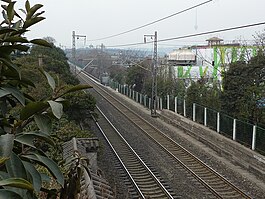Beijing–Guangzhou railway
The Beijing–Guangzhou Railway or Jingguang Railway (simplified Chinese: 京广铁路; traditional Chinese: 京廣鐵路; pinyin: Jīngguǎng tiělù) is a major arterial railway that connects Beijing in the north with Guangzhou in the south. This dual-track electrified line has a total length of 2,324 kilometres (1,444 mi)* and spans five provinces through north, central and south China. The line passes through the provincial capitals of each of those provinces, namely: Shijiazhuang (Hebei), Zhengzhou (Henan), Wuhan (Hubei), Changsha (Hunan) and Guangzhou (Guangdong). The line's two terminal stations are the Beijing West Railway Station and the Guangzhou Railway Station.
History

The Jingguang Railway was originally two railways: the Beijing–Hankou Railway in the north from Beijing to Hankou, and the Guangdong–Hankou Railway in the south from Wuchang to Guangzhou. Hankou and Wuchang are both parts of the city of Wuhan, separated by the Yangtze River. The Jinghan Railway, 1,215 km in length, was built from 1897 to 1906.[1] Work on the Yuehan Railway began in 1900 and progressed more slowly.[1] The Guangzhou-Sanshui section was built in 1903. The Changsha-Zhuzhou section was completed in 1911, followed by the Guangzhou-Shaoguan section in 1916 and the Wuchang-Changsha section in 1918.[1] Work on the last section between Zhuzhou and Shaoguan began in 1929 and was finally completed in 1936.[1] During the period from 1927-1949 when Beijing was renamed Beiping the railway was officially renamed the Beiping-Hankou Railway (Pinghan Tielu 平汉铁路).
In 1957, with the completion of the Wuhan Yangtze River Bridge, the two railways were joined into one line and renamed the Beijing–Guangzhou Railway, or Jingguang Railway.[1]
On 7 February 1923, workers of the Beijing-Wuhan Railway Workers' association launched a massive strike demanding better workers' rights and protesting oppression by warlords. The strike organized by Shi Yang and Lin Xiangqian was an early example of worker mobilization by the Communist Party of China.[2]
Locations served

From north to south:
- Beijing (Fengtai Station)
- Shijiazhuang, Hebei
- Handan, Hebei
- Xinxiang, Henan
- Zhengzhou, Henan
- Luohe, Henan
- Xinyang, Henan
- Hankou, Hubei
- Wuchang, Hubei
- Yueyang, Hunan
- Changsha, Hunan
- Zhuzhou, Hunan
- Hengyang, Hunan
- Shaoguan, Guangdong
- Guangzhou, Guangdong
Service

Currently, the nonstop Beijing-Kowloon "Jingjiu" Through Train operates on this line. Prior to 2003, this train called at stops along the route before they were eliminated to create a through service directly from the capital to Hong Kong.
Parallel lines
The Beijing–Kowloon Railway, completed in 1996, is another "conventional" railway connecting Beijing with the Pearl River Delta. It runs mostly within 100–300 km to the east of the Beijing–Guangzhou Railway.
The Beijing–Guangzhou High-Speed Railway runs through the same major cities as the "original" Beijing–Guangzhou Railway, on a slightly different route (avoiding built-up areas, and having a greater curve radius, for higher speeds and somewhat shorter overall length). In most cities along the line, the high-speed trains will stop at different, purpose-built stations, rather than the older stations served by the "original" Beijing–Guangzhou Railway.[3] The Wuhan to Guangzhou section of the high-speed railway opened in 2009, and the Beijing to Wuhan section opened in 2012.
As consecutive sections of the Beijing–Guangzhou High-Speed Railway become operational, the railway authorities shift a large portion of passenger traffic from the original Beijing–Guangzhou Railway to the new high-speed line. This allows an increase in the amount of freight volume transported over the original Beijing–Guangzhou Railway. For example, according to preliminary estimates, after the entire Beijing–Guangzhou High-Speed Railway opens, the annual freight capacity of the northern half of the Beijing–Guangzhou Railway (between its two main freight stations, Beijing's Fengtai West Station and Wuhan North Railway Station) would increase by 20 million tons.[4]
Accidents
- 2009 Hunan train collision, 3 dead, 50+ injured.
See also
References
- ^ a b c d e (Chinese) "京广铁路" Tieliu 2007-01-08
- ^ "Anniversaries of important events -- Feb. 7 Great Strike"
- ^ Hung, Wing-tat; Brunello, Lara; Bunker, Jonathan, Critical Issues of High Speed Rail Development in China (PDF), p. 4
- ^ 京广高铁座位分四档 武汉赴京最低约500多元 (Seats on Beijing–Guangzhou High-Speed Railway will come in four classes; lowest Wuhan to Beijing fare around 500 yuan) , 2012-12-15 Template:Zh icon


